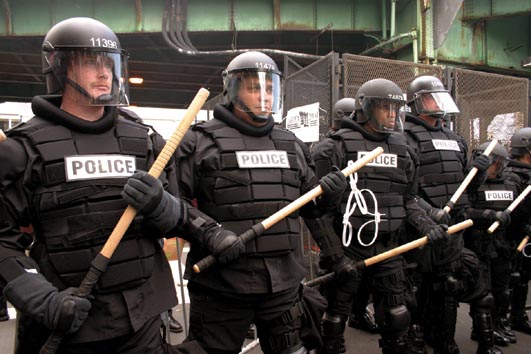
Does Law Require Violence?
I’ve gotten a few requests, so I’ll post the version of my comments on the papers on “Is Government Necessary” that I had prepared prior to the Mont Pelerin Society meeting in Reykjavik. The papers on which I commented were by Professor David Friedman of Santa Clara University (available here) and by Professor Birgir Thor Runolfsson of the University of Iceland (he was ill and could not deliver the paper in person, but the one I received just prior to the conference was substantially similar to his essay on “Institutional Evolution in the Icelandic Commonwealth,” which was published in Constitutional Political Economy.)
The remarks I gave orally included some additional remarks on the paper by Professor Boudewijn Bouckaert of the University of Ghent, but I had only gotten the paper the day before. I may revise the comments later by inserting my pencilled in remarks on Professor Bouckaert’s (quite good) paper. But until then, some of my thoughts on the question “Is Government Necessary?”










Thank you for that. I will be thinking about the ideas in the papers and getting the sources in your foot notes for a course I hope to take next semester on the foundations of modern law.
Superb comments, many sage points. I skimmed the Runolfsson and Friedman papers and have two small comments on your comments.
It may have been preferable allow switching Hreppar without moving, but they seem to have existed very early (“probably in the settlement period or the 10th century”) and I see nothing in Runolfsson indicating that the Hreppur led to the downfall of the commonwealth. The “taxing units that were difficult to escape” were the areas of latter-day chieftans, as it became difficult as a practical matter to switch chieftans. (I wonder why the number of chieftans was limited in the first place.)
Your fourth conclusion is probably true, but leading up to it, I don’t see an implcation that unified command by a professional military cadre requires that cadre to claim a legitmate monopoly on the use of defensive force. Friedman doesn’t make that claim.
Thanks for the comment! I’ve got to run right now, but I’ll try to respond later. (Maybe not until Wednesday, when I’ll have my library and can respond properly.)
About a decade ago I tried my hand at addressing some of these military-defense-under-anarchy problems. For what it’s worth, here’s the link:
http://libertariannation.org/a/f22l3.html
Ack! I just noticed that I didn’t answer Mr. Linksvayer’s points. I’ve got to run at the moment, but I’ll try to get to it this evening. Sorry for the delay!
I’ve read somewhere – I think in an essay by Roderick Long – that the “taxing units that were difficult to escape” were church parishes; the church owners tended to be godhar, but this was not a product of the godhordh system itself.
i dont know
(I finally got around to reading Palmer’s paper today on BART, and it does mention the church tax.)